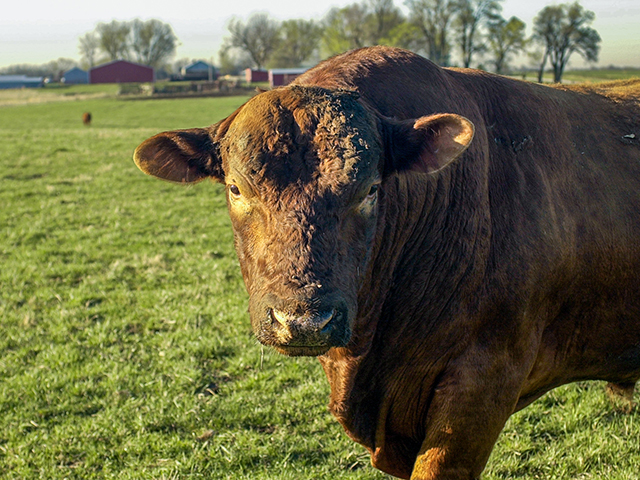Ask the Vet
Don't Let His Good Looks Fool You
READER: My neighbor sells registered Black Angus bulls to high-end cattle ranchers. I told him if he ever had a cull bull, let me know. He has one, but it only has one testicle. My herd is Angus, not registered. I know they test all their bulls. They think this one is only good for hamburger. Do you think he's a viable herd bull?
Dr. McMillan: Cryptorchid animals have either one (monorchid) or both testicles that do not descend into the scrotum. Testicles retained close to the body, or in the abdomen, do not produce fertile semen but they do continue to produce testosterone.
Testosterone can lead to more aggressive behavior, has been linked to an increase in "dark cutters" (dark, off-color meat), and may decrease tenderness of beef. So, steaks and roasts from a cryptorchid animal could be tougher than from steers castrated prior to weaning. Hamburger meat should be fine, though. In fact, a lot of lean hamburger meat comes from cull bulls.
Could this bull breed cattle? If only one testicle is retained, he certainly could, but his serving capacity would be reduced. In other words, he might be sub-fertile at best. This could lead to fewer calves being born, or calves born later in the calving season.
While little research has been done on the heritability of cryptorchidism in cattle, data from other species (especially horses and dogs) has suggested the condition is highly heritable and there is no reason to believe cattle would be any different. So, using a cryptorchid bull, even in a commercial operation, could increase the number of cryptorchid calves. This can create issues both in the herd he is used in, and in the supply chain.
If you want hamburger meat, go for it. But resist the temptation to use him as a herd bull no matter how good he looks.
P[L1] D[0x0] M[300x250] OOP[F] ADUNIT[] T[]
READER: For years, I've used artificial insemination (AI) on early calvers to increase quality and genetic diversity in the cow herd. I used the CIDR Synch protocol, bred cows in heat and had good success. My arthritis has gotten to the point, however, where I just can't do it anymore. I am thinking about trying timed AI and hiring an AI technician to breed my cattle. What are your thoughts on timed AI?
Dr. McMillan: As you probably know, there are more synchronization programs out there than you can shake a stick at as we say in the South, and many are timed AI (TAI) protocols.
There is a relatively new program we have had very good success with called the 7+7 Synch protocol. Cattle are given prostaglandin on Day 0. On Day 7, cattle are given GnRH and have a CIDR implanted. On Day 14, the CIDR is removed, and a second prostaglandin injection is given. Then on Day 17 (or more precisely 66 hours) the cows are AIed and given a second injection of GnRH.
Most trials have demonstrated higher pregnancy rates with this protocol than other protocols. Some have reported 80% or better conception, but conception rates vary widely in real world operations based on many factors, from nutrition and body condition to skill of the person doing the AI.
There are many good articles available discussing this protocol. It's worth a look for all producers, but it really may fit the bill for you.
READERS TALK BACK:
A recent question about how to keep bulls from fighting when reintroducing them after breeding season brought lots of reader mail, all with a common theme: Pour on the vinegar.
-- "My wife read somewhere that pouring apple cider vinegar down the top line and on the head of a new bull would protect it. Since we use about 15 bulls, I laughed, but I tried it. To my surprise, it worked. The new 'treated' bull was snorted at and bellowed at, but not attacked. I've used this ever since, and it really works." -A. Wright
-- "Applying apple cider vinegar on present bulls within a concrete and/or grassy area, and applying it also on the new bulls being introduced into said area has decreased broken bones and dead bulls." -B. Weber
-- "I read that pouring vinegar on bulls to make them smell alike helps. We did it this year, and it helped ... next year a hand sprayer will be used." -J. Roberts
**
-- Please contact your veterinarian with questions pertaining to the health of your herd. Every operation is unique, and the information in this column does not pertain to all situations. This is not intended as medical advice but is purely for informational purposes.
-- Write Dr. Ken McMillan at Ask The Vet, 2204 Lakeshore Dr., Suite 415, Birmingham, AL 35209, or email vet@progressivefarmer.com
[PF_0122]
(c) Copyright 2022 DTN, LLC. All rights reserved.




